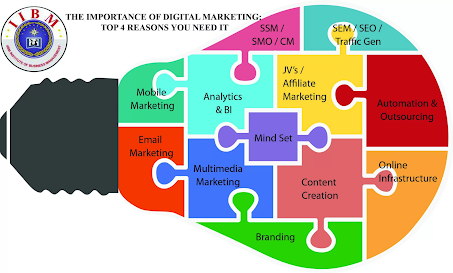The Vital Role of Digital Marketing in Today’s Business Landscape
Digital marketing has become a vital tool for businesses looking to prosper in the fast-paced, globally connected corporate environment. The internet and other digital technologies have made it impossible to reach and interact with today's customers employing only conventional methods of marketing. This essay will discuss the value of digital marketing and how it has transformed the way companies interact with their customers, increase revenue, and foster customer loyalty.
Global contact and Targeted Audience:
One of digital marketing's biggest benefits is its unmatched capacity to precisely contact a wide range of people worldwide. Businesses can target particular demographics, interests, and behaviors through channels like social media, search engines, email, and mobile apps, guaranteeing that the appropriate audience gets reached by their marketing messages at the appropriate moment. The use of digital marketing as opposed to traditional advertising channels, enables highly focused efforts, increasing advertising budget efficiency and reducing waste.
Cost-Effectiveness and Measurable Results:
With digital marketing, companies of all sizes can compete on an even playing field with industry titans using relatively minimal budgets. Digital marketing efforts can have lower costs and higher returns on investment when compared to traditional marketing channels like print or television advertising. In addition, since digital marketing is real-time, advertisers can monitor and evaluate campaign performance indicators like website traffic, conversion rates, engagement levels, and customer reviews. This allows them to make data-driven decisions and tailor their approaches for optimum impact.
Improved Customer Engagement and Interaction:
Digital marketing, as opposed to conventional bilateral interaction methods, enables two-way contact between companies and their clients, creating significant connections and interactions. Through blogs, forums, social media sites, through online communities, companies can interact with their audience in real-time, answering questions, resolving issues, and requesting feedback. Businesses can enhance customer loyalty and promote brand advocacy through the provision of relevant material, personalized recommendations, and customized experiences. This can result in greater rates of retention of clients and enhanced lifetime value.
Increased Brand Visibility and Authority:
To stand out from the competition and win over customers in the present congested marketplace, it is imperative to build a strong online presence. Businesses may boost their exposure in the SERPs of search engines and position themselves as authoritative voices in their respective fields by using digital marketing methods like influencer relationships, content marketing, and search engine optimization (SEO). Through regular delivery of meaningful and pertinent information that appeals to their intended audience, companies can establish themselves as dependable consultants and thought leaders, gradually gaining the patrons' respect and allegiance.
Adaptability and Flexibility:
Digital marketing offers unmatched flexibility and agility compared to traditional marketing initiatives, which frequently call for lengthy waiting periods and set schedules. In a constantly changing environment, firms may remain adaptable and responsive by having the capacity to swiftly develop, implement, and adjust campaigns in response to shifting market conditions, consumer preferences, and rivalry. Internet marketers can take advantage of opportunities and modify their strategies quickly to maximize their impact and stay ahead of the curve, whether they are launching an innovative item, promoting a seasonal promotion, or capitalizing on the hottest topic.
Continuous Improvement and Data-Driven Insights:
One of the biggest advantages of digital marketing may be its reliance on analytics and data to support performance improvement and decision-making. Through the use of tools like Facebook Insights, Google Analytics, and customer relationship management (CRM) systems, enterprises can obtain a significant understanding of consumer behavior, inclinations, and buying trends. Equipped with this data, marketers can discern patterns, unearth prospects, and enhance their approaches to more effectively cater to the requirements and anticipations of their intended audience.
Consultation:
Businesses may maximize their digital marketing efforts for long-term success and sustainable growth through ongoing testing, experimentation, and iteration. To sum up, in an increasingly digital world, digital marketing has emerged as a crucial element of contemporary corporate strategy, providing unmatched chances for connecting with, interacting with, and winning over clients. Businesses can also have a competitive edge. The relevance of digital marketing will only increase as customer behavior and technology change over time. As a result, companies must embrace innovation to stay ahead of the curve.

Comments
Post a Comment